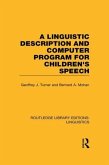It is through language that we make ourselves understood; but it is also language, according to one of the basic tenets of psychoanalysis, that allows us to understand, and thus to transform, what goes on inside us. What should be done when language and communication have not yet been established, as is the case with young children, or when they are sterile, as sometimes occurs with adults? How does language manage to control and grasp the affects?Referring to numerous examples from his psychoanalytical practice, with children and adults, and to his experience as a linguist, Laurent Danon-Boileau examines what lies at the centre of language and tries to understand the forces that'stimulate speech. To civilize the emotions and to enable culture to be symbolized, the unpredictable - freed from repetition - must be allowed to emerge.This is a reflection on language, seen as a tool toward improved self-knowledge. Language is not simply a means of communication it also serves the crucial function, for adults and children, of emotional control. Based on his experience as a psychoanalyst and a linguist, the author delves into the origins of communication and its disorders, and explains what can be done when language fails, when it is inadequate or sterile.Laurent Danon-Boileau is a therapist at the Centre Alfred-Binet, a professor of linguistics at the University of Paris-V and a research fellow at the Laboratory for the study of language pathologies and language acquisition in children (at the CNRS). He is the author of Des Enfants sans langage (2002), La Naissance du langage (2002), Les Troubles du langage et de la communication (2004) and L'Enfant qui ne disait rien (1995).
Bitte wählen Sie Ihr Anliegen aus.
Rechnungen
Retourenschein anfordern
Bestellstatus
Storno








